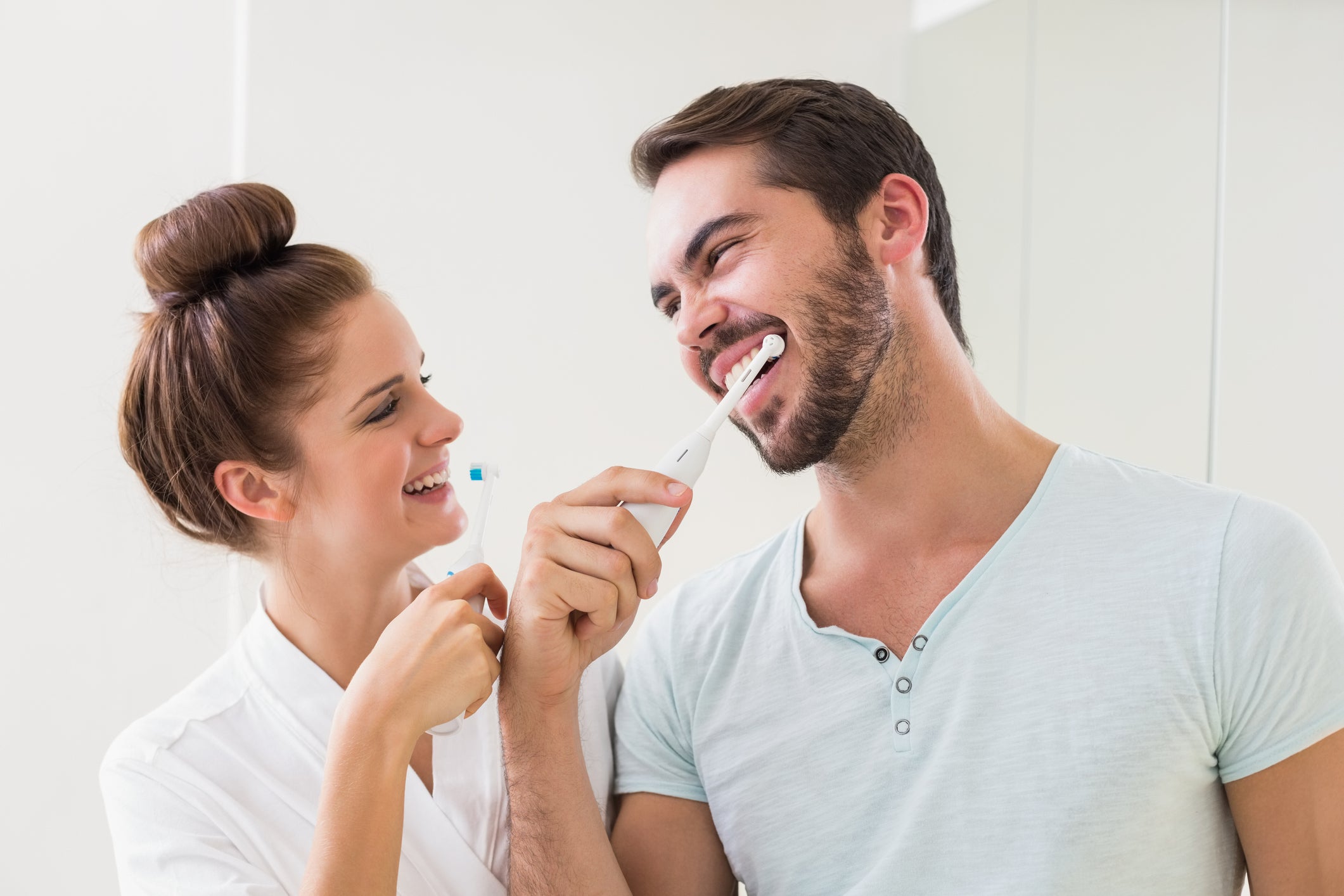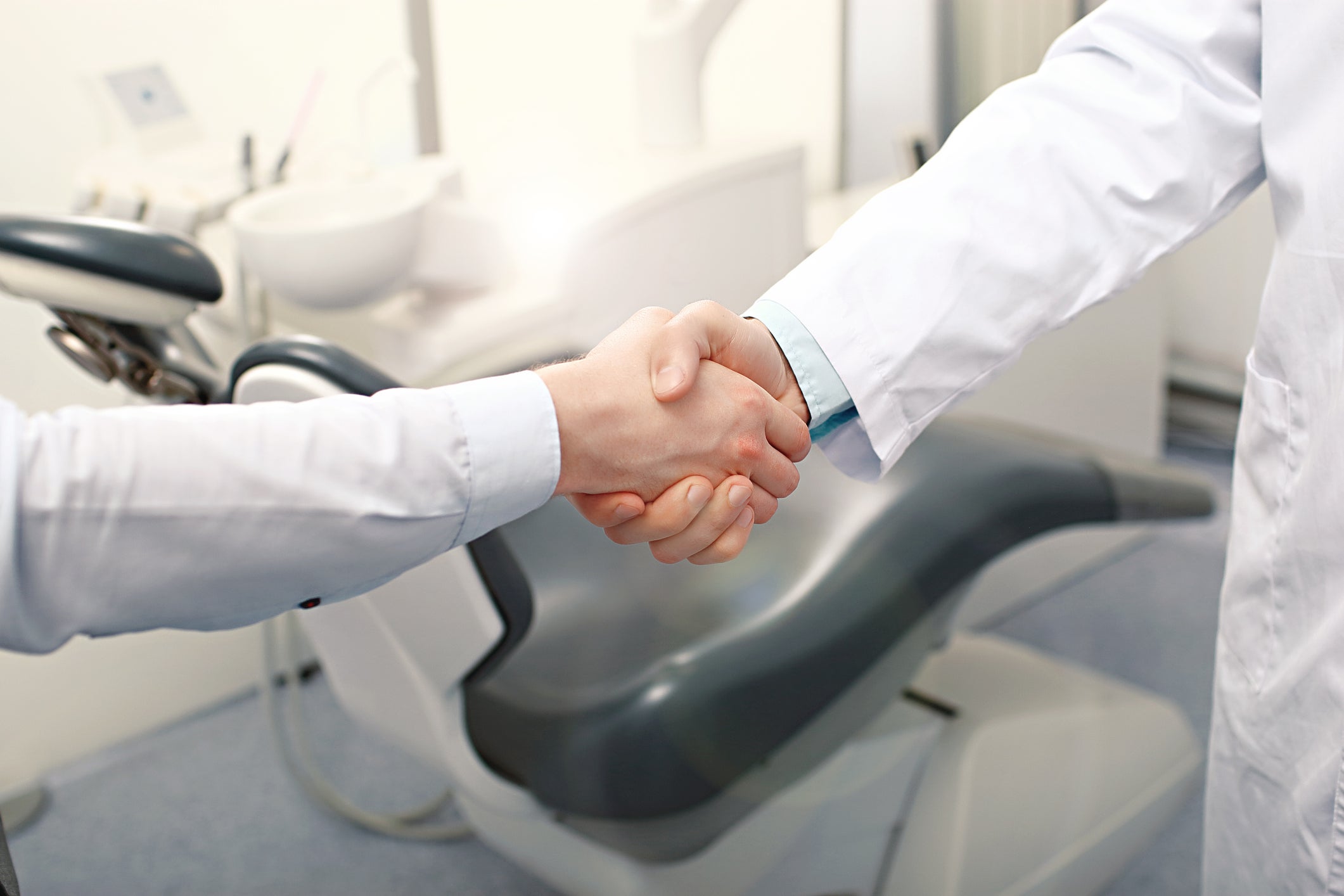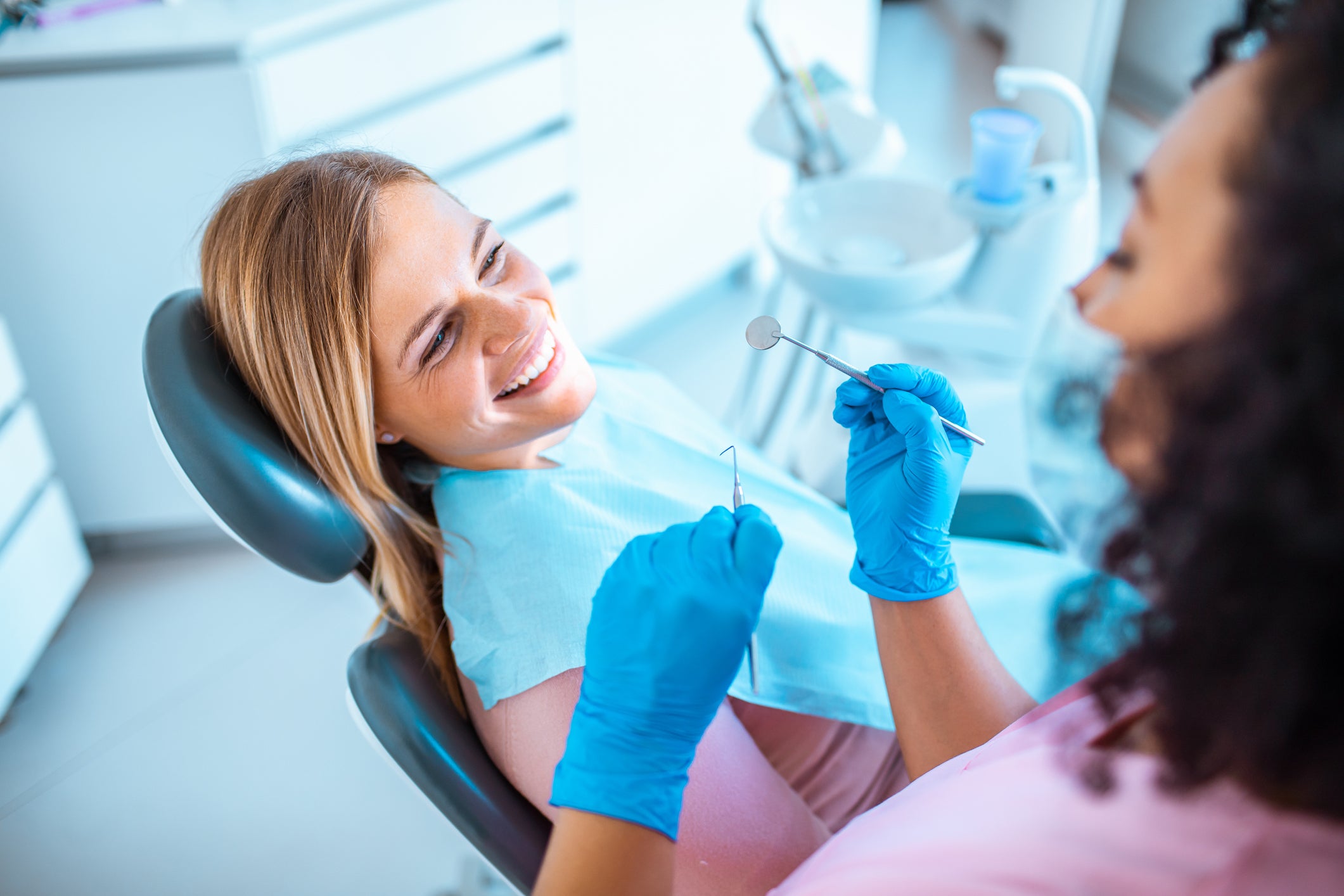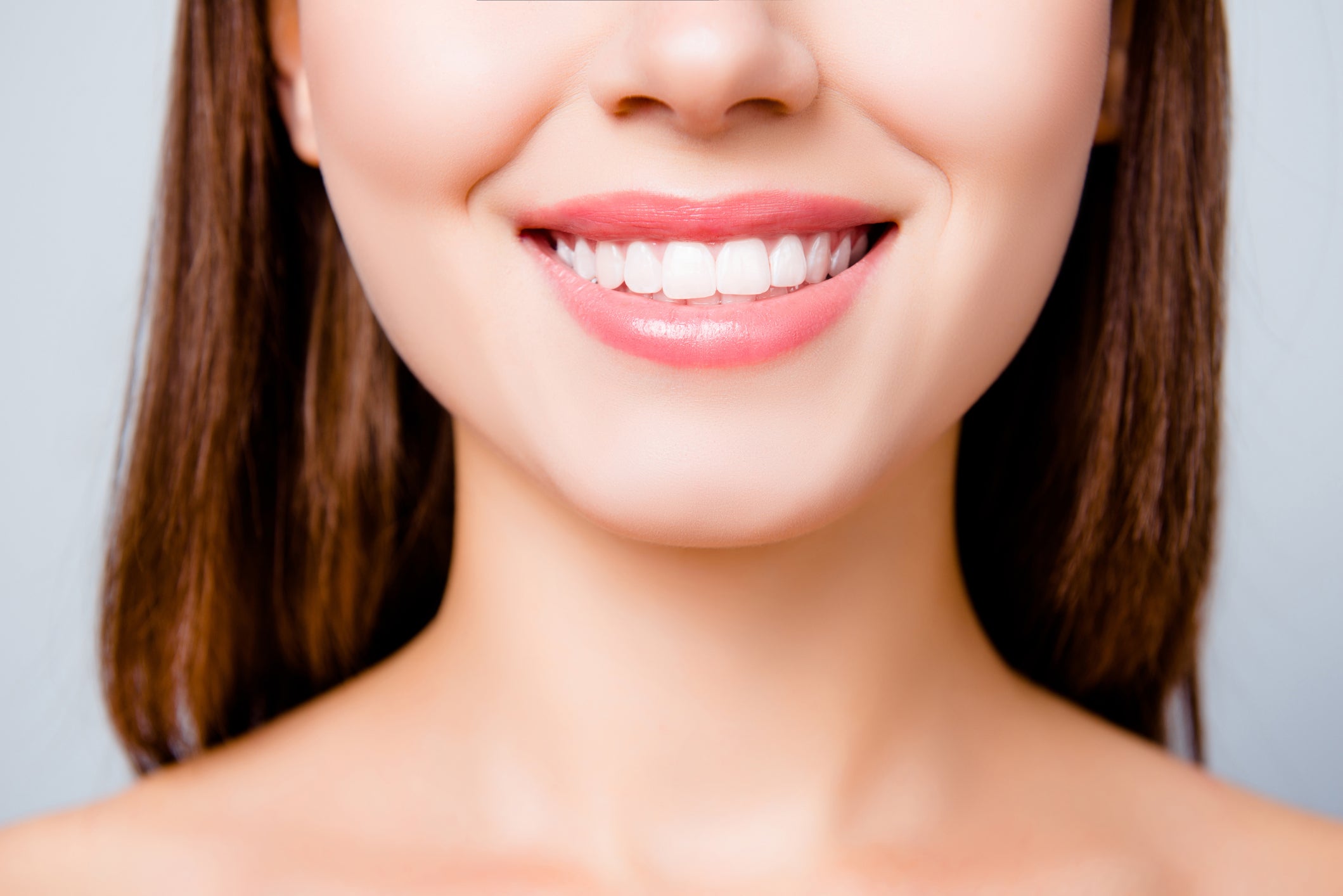-
8 Tips for Healthy Teeth in 2025

A healthy smile never goes out of fashion. If you’re looking to take better care of your teeth in 2025, follow these eight tips to promote great oral health this year. Continue reading “8 Tips for Healthy Teeth in 2025”
-
Dental Health Resolutions for 2023

It’s that time of year again, when people make their New Year’s resolutions. What’s your goal for the year? Most people choose something that has to do with their health, but too few make dental health resolutions. This year, why not shake things up and improve your dental health? Here are some suggestions for you, of dental health resolutions for 2023.
- Keep up with the basics. Brush your teeth twice a day, and pay attention to your technique. Using a soft-bristled toothbrush, held at a 45-degree angle to the gumline, brush your teeth gently, for at least two minutes, using circular motions to clean off plaque and bacteria without damaging your gums. Floss at least once each day, using a water flosser or traditional string floss. Keeping up with these simple habits will not only reduce your risk of tooth decay, but can also lower your risk of serious illnesses like cardiac disease or even Alzheimer’s.
- Swap sweet drinks for water. Reducing your sugar intake is important for your oral health, and sugary drinks are at the top of the list of things to avoid. Because sweet drinks prolong your teeth’s exposure to sugar, they do significantly more damage than other kinds of sugary treats. Drinking water, on the other hand, is good for your oral health as well as your overall health. When you’re well-hydrated, you produce the right amount of saliva, and drinking water during the day helps keep your teeth clean between brushings. What’s more, tap water has added fluoride, which can strengthen your tooth enamel.
- Improve your diet. Eating a more nutritious diet may already be on your New Year’s resolution list, especially if you’re trying to lose weight. What you may not realize, though, is that eating well is a big part of maintaining good dental health. The nutrients you consume when you eat fruit, vegetables, legumes, and nuts can protect against inflammation and bacteria, and this helps keep your teeth and gums healthy. Raw fruits and vegetables help remove plaque from your teeth, and dairy products contribute calcium that strengthens your teeth.
- Say no to smoking. Actually, say no to all tobacco products! Using tobacco causes bad breath, tooth discoloration, cavities, gum disease, and many other health conditions, including throat, lung, and oral cancer. Smokers are also more likely to lose their teeth than other people. Make this the year you quit, seeking professional help if you need to, and your health will begin to improve.
- Reduce dry mouth. Saliva plays an important role in maintaining your oral health. Not only does it wash away food and debris, but it actually helps strengthen your enamel and neutralize your mouth’s pH level. If you have dry mouth, it can lead to dental problems, so combat it by drinking plenty of water, chewing sugar free gum, drinking milk or consuming dairy products, and limiting alcohol consumption. You can also talk to your dentist about medications you’re taking and if they could be causing this problem.
- Make a habit of seeing your dentist. Having a dental check-up and cleaning twice a year helps keep your teeth clean and healthy. What’s more, seeing you every six months allows your dentist to spot minor issues more easily, before they turn into serious problems. This will save you not just pain and inconvenience, but also money, since major dental issues can be far more expensive than simple maintenance. Your dentist can also recommend treatments to address any dental problems you may be experiencing, like an improper bite or damaged tooth.
At Park 56 Dental Group, we offer pediatric, prosthodontics, endodontics, oral surgery, Invisalign®, emergency, and sedation dentistry, all at the highest level of treatment. We serve the Midtown, Central Park, Upper East Side, Park Avenue, and all surrounding Manhattan and New York areas, with a patient-centered practice that has hours to fit your schedule. Schedule your complimentary consultation today by contacting us online or calling us at (212) 826-2322.
-
Signs it’s Time to Switch to a New Dentist

Change can be difficult, but sometimes it’s necessary. Is it time for you to change dentists? It can be a hard decision to make, especially if you’ve been with your dentist for a long time. Still, there are some clear signs that it’s time to move on.
- Maybe your needs have outgrown your dentist. If you’ve been going to a pediatric dentist and you’re now an adult, it’s definitely time for you to move along. If you have children, it’s smart to choose a dentist who offers both pediatric and adult dentistry.
- It could be that someone has moved. Maybe it’s you, or maybe it’s your dentist. Whether your favorite dentist has moved away from the practice, or you’ve relocated to a new town, a change in location can warrant a change of dentist. It’s important that the dentist you trust is in a location that’s convenient for you.
- Sometimes, your dentist won’t take your insurance. They may have changed their policies, or your may have switched providers. If your dental office is no longer in-network for your insurance plan, it’s time to switch.
- You might have noticed some red flags. If your dentist pressures you to use their practice for services for which you should consult a specialist, if the environment has changed to something that doesn’t feel hygienic or safe, or if you feel uncomfortable with the dentist or staff, move on. If you’re constantly having to dispute billing or the dentist discourages you from seeking a second opinion, those are also reasons to switch.
- If you’re not happy, that’s reason enough. If the dental practice you’re using is no longer meeting your needs, you have the right to find one that will. Whether it’s a lack of services provided, poor customer service, or another reason, look for a dentist where you’ll be happy.
Once you’ve decided to switch, what’s the next step? Do some research and find a practice that will be the right fit for you and your family. Look at the services offered, check out reviews, and research the dentist’s background and certifications. Beyond that, read up on the practice to determine their values, philosophy, and level of technology. Once you’ve done this, visit the office to see if it lives up to your expectations and meets your needs.
At Park 56 Dental Group, we are committed to meeting each patient’s specific needs. We’ve been providing top-quality care and treating each patient individually since 1997, making it comfortable and easy to visit the dentist. We accept many different insurance plans and welcome you to visit us so that you can make an educated decision about your dental care.
If you’re looking for the perfect dentist, choose the practice that was voted best dentist in NYC! At Park 56 Dental Group, we offer pediatric, prosthodontics, endodontics, oral surgery, Invisalign®, emergency, and sedation dentistry, all at the highest level of treatment. We serve the Midtown, Central Park, Upper East Side, Park Avenue, and all surrounding Manhattan and New York areas, with a patient-centered practice that has hours to fit your schedule. Schedule your complimentary consultation today by contacting us online or calling us at (212) 826-2322.
-
Why You Should Take Advantage of Your Dental Insurance

If you have dental insurance, your current plan will likely reset on January 1. Whether you pay for dental care through a benefits plan or use an FSA, don’t leave your hard-earned dental dollars on the table—schedule the dental services you need today!
Why Should You Use Your Dental Insurance?
- Coverage expires at the end of the year: Most dental plans cover two preventative visits per year and have an annual maximum. Coverage doesn’t roll over, so any unused benefits will go to waste.
- You’re already paying for it: Dental coverage through your employer deducts automatically from your paycheck. If you don’t visit the dentist, that money is simply wasted.
- Prevention is better than cure: Utilizing your dental insurance helps prevent oral health problems before they start. Even if you don’t need restorative or cosmetic services, you should still have your teeth cleaned and examined twice a year. Your plan should cover most or all of the cost, making it affordable to maintain a healthy smile.
How to Make the Most of Your Dental Benefits
- If your mouth is already in good shape, keep visiting the dentist every six months to keep it that way.
- If it’s been a while since your last appointment, meet with a dentist to determine your dental needs and what treatments are available. Getting everything done before the end of the year helps you make the most of your annual maximum.
- If you have periodontal disease or another chronic oral health problem, your dental benefits should make ongoing treatment more affordable.
How to Make the Most of Your Flexible Spending Account
A Flexible Spending Account (FSA) is a pre-tax way to fund qualifying medical expenses. You set it up through your employer and decide how much you want to contribute to the account each month. In general, FSA funds expire at the end of the year, so you’ll lose any money you haven’t spent once January 1 rolls around. Here’s how to make sure you use these funds to the fullest:
- Plan carefully during open enrollment to avoid overfunding your FSA.
- Talk to your dentist in the summer or fall about any procedures you might need soon. You may be able to use your FSA to pay any associated co-pays or co-insurance.
- Schedule any services you need before the end of the year to ensure your FSA dollars are used in time.
- Remember that FSAs typically cannot fund cosmetic procedures, such as teeth whitening, veneers, or cosmetic braces.
Park 56 Dental accepts insurance plans from Delta Premier, Delta PPO, MetLife, Guardian, Aetna, and Cigna. We also work with CareCredit and Chase Healthcare Advance for patients who don’t have insurance coverage. If you have any other questions regarding finances and dental care, feel free to ask. Then, contact us at (212) 826-2322 to schedule an appointment at our spa-like dentist office. We have served the 10022 zip code area of New York since 1997.
-
What to Expect During Your First Visit to Park 56 Dental

At Park 56 Dental, we are committed to providing our patients with safe, gentle, high-quality dental care. We understand that you or your child may feel apprehensive about your first visit to our office. That’s why we’ll do everything we can to not only make you feel comfortable but truly pampered during your time with us. Here’s what to expect when you visit Park 56 Dental in NYC for the first time.
Review Your Dental & Medical History
Our first goal during your dental consultation is to understand your health. We will review any records you have from previous dentists, along with the patient information form we ask you to complete. Be sure to provide as much information as possible to accurately convey your health status.
Also, don’t forget to bring your insurance card so you can take advantage of your dental benefits when paying for services. This is also a good time to discuss any dental anxiety you have. Sedation dentistry could be a good option for you, depending on your needs.
Take Digital X-Rays
The next step is to have a closer look at your teeth and gums by taking X-rays. The digital imaging technology we use decreases radiation exposure by 90%, ensuring your safety while also making images available for immediate review. Your X-rays serve as a baseline for your current dental health and help us recommend immediate and long-term treatment options.
Clean and Polish Your Teeth
With digital imaging complete, it’s time to clean your teeth. Here’s what this entails:
- Physical exam: A dental hygienist checks your teeth and gums for signs of gingivitis. If major problems are detected, the hygienist might call in the dentist to make sure it’s okay to proceed with the cleaning.
- Plaque and tartar removal: Using a small mirror to check all surfaces, your hygienist removes plaque and tartar buildup from your teeth. This may involve scraping and spraying your teeth with a high-pressure water jet.
- Polishing: The hygienist polishes and removes stains from your teeth using a gritty paste.
- Flossing and rinsing: The hygienist touches up your smile by flossing and rinsing with water.
- Fluoride treatment: An optional fluoride gel at the end of your cleaning helps protect your teeth against cavities until your next dentist appointment.
Meet with the Dentist
Following a comprehensive teeth cleaning, your dentist will sit down with you to review the findings and discuss any immediate treatment needs. This is your chance to ask questions and discuss any cosmetic dentistry services you’re interested in, including veneers, tooth reshaping, whitening, and more.
Everyone’s busy, but regular dental checkups are an important part of maintaining a healthy smile! In fact, the American Dental Association recommends visiting the dentist every six months. If it’s been longer than this since your last visit, contact Park 56 Dental at (212) 826-2322 to schedule your first appointment with NYC’s best dentist. We have over 20 years of experience serving patients in the 10022 zip code area.
-
How to Care for Yourself After a Dental Procedure

Root canals, tooth extractions, and dental implants are common smile restorations that require some recovery time. Choosing an experienced oral surgeon is the first step toward ensuring a comfortable recovery.
At Park 56 Dental, we offer sedation dentistry to make your time in the dentist’s chair as comfortable as possible. We also review the recommended aftercare with you before you undergo any procedure, so you know exactly what to expect during your recovery. And if you have any urgent questions for us, rest assured that we answer emergency calls 24 hours a day.
Here are some general aftercare tips we recommend to take care of yourself after a dental procedure.
- Take it easy: Take time off school or work and rest at home. Avoid physical exertion for two to three days, and keep your head propped up with pillows to reduce inflammation.
- Apply ice packs: Ice helps to numb any localized pain and brings the swelling down. Throughout the first recovery day, apply a towel-wrapped ice pack for 15 minutes on, 15 minutes off.
- Leave gauze pads in place: Wait for three or four hours to remove any gauze pads your oral surgeon put in your mouth. This helps minimize bleeding and helps the surgical area clot properly.
- Eat soft food: Stick to a liquid or soft-food diet for a few days. Chilled soup, mashed potatoes, scrambled eggs, yogurt, smoothies, milkshakes, and ice cream are all good options.
- Avoid hot foods and drinks: Wait until the local anesthesia wears off completely to eat or drink anything hot so you don’t accidentally burn your tongue or the roof of your mouth.
- Don’t drink through a straw: Suction in the mouth can dislodge the blood clot from the treated area, leading to a painful condition called dry socket. To prevent this, don’t drink from a straw for three days after oral surgery.
- Take medication: Over-the-counter pain relievers can help make your recovery more comfortable. If your oral surgeon prescribes antibiotics, take those as directed as well.
- Rinse with salt water: 24 hours after your procedure, rinse gently with warm saltwater. A good ratio is one-half teaspoon salt per one-half cup of water. Rinse after every meal and snack to help remove food particles from around the surgical area.
- Brush carefully: Avoid brushing the treated area until it has fully healed, but continue to brush the rest of your teeth.
- Don’t smoke or drink alcohol: These habits can interfere with the healing process, so avoid them for at least 24 hours. Better yet, quit smoking and always limit your alcohol intake to improve your overall health.
If you’re looking for skilled dental care and oral surgery in NYC, you’ve come to the right place. Park 56 Dental has been voted NYC’s best dentist, so why would you go anywhere else for your next dental procedure? To learn more about our services, please call us at (212) 826-2322 or contact us online today.
-
How to Prevent Gum Recession

Receding gums are a common oral health problem. You know your gums are receding if you have less gum tissue than you used to and your teeth look longer than normal. What you’re seeing is the exposed tooth root, which may be sensitive to hot and cold temperatures. Gum tissue doesn’t grow back, so it’s important to prevent gum recession before it’s too late.
- Brush your teeth gently: It’s a misconception that the more aggressively you brush, the cleaner your teeth become. Not only does vigorous brushing wear down tooth enamel, but it also irritates your gums. Switch to a soft-bristled toothbrush, and be careful about how much pressure you use when brushing each morning and night.
- Floss daily: Flossing targets the hard-to-reach places between your teeth and along the gum line. Scraping away plaque and stubborn food particles from these areas is critical to keep your gums healthy and prevent them from receding.
- Stop smoking: Tobacco use of any kind is horrible for your oral health. It leaves a sticky film in your mouth that can cause gum recession if not removed thoroughly. Stop smoking to promote gum health, prevent tooth stains, and reduce the risk of oral cancer.
- Eat a nutritious diet: Gum tissue, like the rest of your body, needs adequate vitamins and minerals for optimum health. Some of the best foods for a healthy smile include apples, carrots, leafy greens, plain yogurt, and almonds.
- Wear a mouthguard: Do you grind your teeth at night? If you’re not sure, your dentist can diagnose this condition, known as bruxism. Then, you can look into getting a custom mouthguard to protect your teeth and gums while you sleep.
- Straighten your smile: Crooked teeth and a misaligned bite place excess pressure on your jawbone and gums, making gum recession more likely. Invisalign is the invisible way to straighten your teeth and keep your gums healthy.
- Avoid mouth piercings: Lip and tongue rings are a surefire way to irritate your gums and cause them to recede. So play it safe and stick to ear piercings to keep your mouth free of foreign objects.
- Visit the dentist: The American Dental Association recommends that most people visit the dentist every six months for a checkup and cleaning. During your exam, a hygienist will remove tartar and plaque from your teeth that can irritate the gums. Your dentist will also check for signs of recession and offer personalized tips to prevent the problem from getting any worse.
If you notice receding gums or other signs of gum disease, reach out to Park 56 Dental. We’ve been voted the best dentist in NYC, so you can rest assured that our team will take great care of you. We offer effective treatments to help slow or even reverse gum disease and recession, including root planing and scaling, flap surgery, and bone and tissue grafts. To learn more, please call us at (212) 826-2322 or contact us online today.
-
Why Should You See a Cosmetic Dentist?

Are you unhappy with your teeth? If you find yourself covering your mouth when you laugh and smiling with closed lips for photos, you could benefit from seeing a cosmetic dentist. While general dentistry aims to preserve oral health, a cosmetic dentist focuses on improving the way your smile looks and feels. Here are the top reasons to see a cosmetic dentist.
- Yellow, stained teeth: Years of eating and drinking tooth-staining foods and beverages can leave your teeth looking yellow and dull. Fortunately, extrinsic stains like these are easy to remove with Zoom!® in-office whitening. In less than an hour, your teeth will be several shades whiter. Use at-home whitening products between visits to help your look last as long as possible.
- Discoloration: Intrinsic tooth discoloration can’t be corrected with whitening. Fortunately, you still have options! Veneers, or tooth-colored shells adhered to the front of your teeth, may be the best choice for giving your smile a bright new look.
- Uneven teeth: If your teeth have worn unevenly, they may now appear pointy, jagged, or misshapen. They may even be different sizes or lengths. Tooth reshaping/contouring is the cosmetic dentistry solution to this problem. With a specially designed tool, the dentist can gently reshape your uneven teeth for a more aesthetically pleasing smile.
- Missing teeth: Whether you had an infected tooth extracted or a traumatic injury left you with a gap in your smile, you can fill the hole with dental bridges or implants. A bridge anchors to dental crowns installed on the two adjacent teeth, while implants are self-supporting fixtures that mount directly to your jawbone.
- Broken, chipped, or fractured tooth: When a tooth is damaged, it’s important to act quickly to save it. Your options include dental crowns, veneers, and bonding (applying composite resin to the surface of the tooth to repair it).
- Cavities: Tooth decay can lead to cavities, which require a filling. If you currently have amalgam (metal) fillings, you can replace them with tooth-colored fillings made of composite or porcelain. This way, you can smile as wide as you want without anyone noticing your dental restorations.
- Crooked teeth: If you want a straighter smile, but you don’t want metal braces, consider what Invisalign® has to offer! The clear, plastic aligners are virtually invisible, gradually shifting your teeth into the desired position without anyone even knowing you have braces.
- Gummy smile: Excess gum tissue can affect your self-confidence and discourage you from smiling. Luckily, this condition is treatable using techniques such as dental crown lengthening, orthodontics, and oral surgery.
If you’re ready to enhance your smile, visit Park 56 Dental, the best cosmetic dentist in New York. We provide an array of personalized treatments designed to restore your self-confidence, many of which can be completed in one office visit. For more information about cosmetic dentistry, or to schedule a free consultation, please call us at (212) 826-2322 or contact us online today.
-
10 Ways to Prevent Tooth Enamel Loss

Enamel is the semi-transparent outer layer of your teeth that protects the more sensitive dentin and pulp beneath from the acids, chemicals, and temperature extremes your mouth endures when you eat and drink. Even though enamel is the hardest substance in the human body, daily wear and tear can eventually cause the surface of your teeth to wear away. Once you lose tooth enamel, it’s gone for good, so it’s important to do everything you can to protect it! Here’s how.
- Limit acidic foods and drinks: When you eat anything acidic, your tooth enamel softens temporarily and loses some of its mineral content. Your saliva slowly balances out the acidity in your mouth, but if this acid attack happens too often, your mouth may not have time to repair itself before some enamel is brushed away. To prevent this, cut back on alcohol, coffee, tea, soda, sports drinks, tomato sauce, and sour candy.
- Eat less sugar: The bacteria in your mouth feed on sugar, producing acid as a byproduct. This is why juice, candy, and other sweet foods are so bad for your teeth.
- Finish your meal with dairy: Enjoying a glass of milk or a piece of cheese at the end of your meal helps rebalance the acidic pH in your mouth.
- Rinse immediately: If you have a hankering for something sweet or acidic, reduce the damage by rinsing your mouth with water once you finish eating.
- Chew sugar-free gum after meals: Chewing gum stimulates saliva flow, which helps remineralize your enamel. Plus, mint gum freshens your breath, making it a win-win.
- Wait an hour to brush: It may sound counterintuitive, but you shouldn’t brush your teeth right after eating. This is when your enamel is weakest, so wait until it has time to harden again before brushing.
- Brush gently: Unless your dentist recommends otherwise, use a soft-bristled toothbrush. Then, brush gently to remove food particles and plaque without scrubbing enamel away.
- Brush with fluoride toothpaste: Fluoride has the amazing ability to remineralize your teeth, strengthening enamel in the process. That’s why it’s so important to use fluoride toothpaste and mouthwash.
- Wear a mouthguard: Nighttime tooth grinding can wear down your enamel. Ask your dentist about getting a custom mouthguard to protect your teeth while you sleep.
- Work with your dentist: Ultimately, the best way to keep your enamel intact is to visit the dentist regularly. A dental professional can spot early signs of erosion and recommend fluoride treatments, prescription toothpaste, and other personalized solutions to help you preserve your smile.
Ready to team up with the best dentist in New York? Look no further than Park 56 Dental! We can help you prevent tooth enamel loss and recommend dental restorations if your smile needs a boost. All the while, you’ll enjoy personalized, quality dental care in a spa-like environment. To get started, please call us at (212) 826-2322 or contact us online to request your free consultation.
-
How to Find the Perfect Dentist

When you’re looking for a dentist, the number of options available can be overwhelming. Factor in anxiety about going to the dentist, and it’s easy to see how finding a dentist could seem like a daunting task. Don’t worry! We’ve got some tips to help you find the perfect dentist for you and your family.
- Ask people you trust. Word of mouth can be the most effective way to find the right dentist. Make a list of dentists recommended to you by family members, close friends, co-workers, and your primary care physician. Don’t worry too much about whether the dentists are in your network; you can often maximize your insurance benefits out of network. Armed with your list, you can begin to narrow the search.
- Find a full-service dentist. Don’t choose a dental practice with limited specializations. Rather, look for one who performs a wide range of services, all in one practice. You don’t want to have to go through the process again when you need a different kind of dental work.
- Check the dentist’s credentials. Make sure your dentist is board certified and has a current state license as well as a clean disciplinary history. Healthgrades.com and your state website will have information about your dentist’s medical school, training hospital, certifications, and malpractice and disciplinary history. Look for solid credentials and plenty of experience.
- Read online reviews but don’t put too much stock in them. Patient reviews can give some insight into how the dental practice is operated. On the other hand, online reviews can be manipulated. Read them, taking note of what patients have to say, but pay special attention to the dentist’s responses to the reviews. If the dental practice responds in a positive way to online reviews, regardless of whether the review is positive or negative, it indicates that the dentists in the practice care about their patient.
- Tour the office. While you’re there, ask questions about things like office hours, technology, the dentists’ training, continuing education, their approach to preventive dentistry, emergency appointments, and financing. Note the cleanliness of the office, friendliness of the staff, and willingness to answer questions.
- Think about your personal preferences. Do you prefer a dentist of a certain gender? Are telehealth appointments important to you? Which dental services do you believe you’ll need most often? Is flexible scheduling a priority for you? When you meet a dentist who checks all the boxes and makes you feel comfortable, that’s probably the perfect dentist for you!
If you’re looking for the perfect dentist, choose the practice that was voted best dentist in NYC! At Park 56 Dental Group, we offer pediatric, prosthodontics, endodontics, oral surgery, Invisalign®, emergency, and sedation dentistry, all at the highest level of treatment. We serve the Midtown, Central Park, Upper East Side, Park Avenue, and all surrounding Manhattan and New York areas, with a patient-centered practice that has hours to fit your schedule. Schedule your complimentary consultation today by contacting us online or calling us at (212) 826-2322.
RECENT POSTS
categories
- Uncategorized
- Cosmetic Dentistry
- Veneers
- Healthier Teeth
- Teeth Whitening
- Dental Health
- Video
- Dental Emergencies
- Invisalign
- Dental Implants
- Root Canal
- Sedation Dentistry
- Infographic
- Dental Crowns and Bridges
- Dental Anxiety
- Gum Disease
- COVID-19
- Bad Breath
- New York Dentist
- Cut out sugar
- General Dentistry
- Oral Health
- Oral Cancer
- Dry Mouth
- Gum Health
- Toothache
- Dental Sealants
- Cavities



